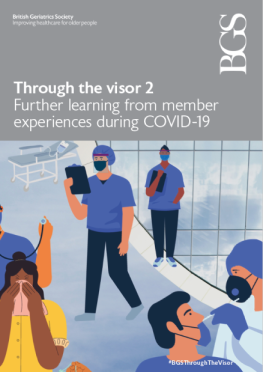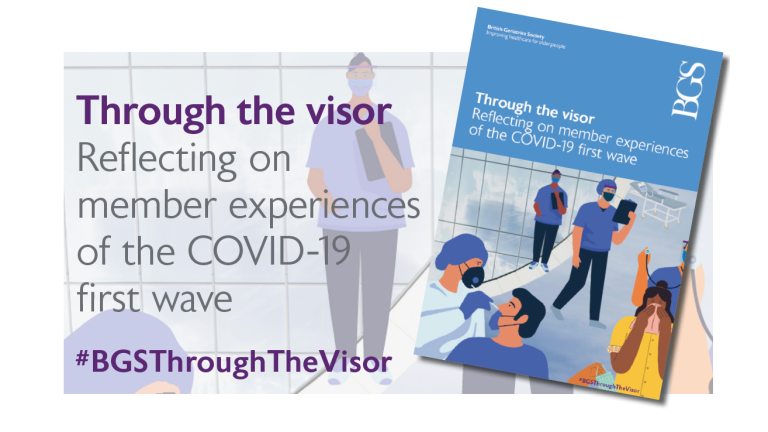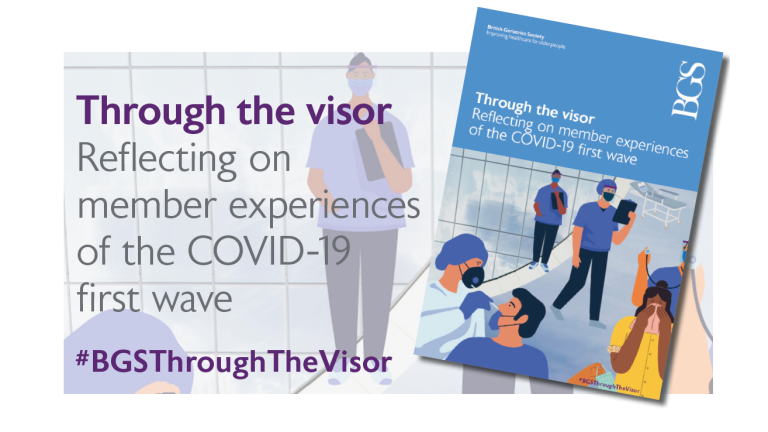Today the British Geriatrics Society (BGS) published a report from a second survey of its members describing their experiences of working through the COVID-19 pandemic during winter 2020-21 and beyond. Respondents represented a variety of professions involved in the healthcare of older people. These included consultants, speciality registrars, specialist nurses, allied health professionals and GPs working in acute, community and primary care. While responses indicated that many practical aspects had improved since our first survey, concerns remained, including the mental and emotional toll on healthcare professionals caring for older people.
The winter of 2020-21 was an extraordinary time for older people’s healthcare in the UK. Having been pushed to their limits by the first wave of the COVID-19 pandemic, as detailed in our earlier Through the Visor report, for BGS members the winter brought even more challenging working conditions. While better access to personal protective equipment (PPE) and testing for both staff and patients was reported, concerns remained about the quality of the PPE being used. Respondents were also less likely to be redeployed or have their job plans changed during this wave of the pandemic. However, 78.5% said that their CPD (Continuing Professional Development) and/or SPA (Supporting Professional Activities) time was cancelled. Many commented that even if their study time was officially protected, in reality they were required to work long, extra hours clinically and did not have time for study. In addition, of the 65% who were able to take planned annual leave, 76% said they continued to check in with work in some form.
The continued impact of the pandemic on BGS members’ mental and emotional wellbeing was a resounding theme to emerge from the second survey. Six out of ten respondents raised issues of anxiety, stress, burnout and struggles in coming to terms with the huge numbers of deaths they have seen among both patients and colleagues during the pandemic. Compounding this issue, many patients and relatives were perceived as less tolerant with NHS staff and systems than they had been during earlier stages of the pandemic. Respondents also identified high levels of anxiety among their family members, attributed to worrying about both the respondent’s health and the increased exposure to COVID infection due to the respondent’s job. BGS members also reported that they believe the standard of care they provide had deteriorated significantly as time and staffing pressures increased during the pandemic. The impact of the pandemic has left some members considering leaving their professions, either in the form of taking early retirement or moving into non-clinical roles.
Dr Jennifer Burns, President of the British Geriatrics Society, commented:
BGS members have gone above and beyond the call of duty during the pandemic, working through the biggest public health crisis in the NHS’s history. They have worked with professionalism and compassion for the older people they serve. The findings highlighted in Through the visor 2 suggest that our members' heroic efforts have come at a significant cost to their wellbeing and mental health. It is also likely that the negative impact caused by the pandemic will further intensify the existing workforce crisis in older people’s healthcare. We have known for many years that we were not training enough specialists in older people’s care to serve the UK’s rapidly ageing population. It is now time to consider how the government can better support and develop this highly skilled workforce”
Dr Claire Copeland, BGS Vice President for Workforce, commented:
The pandemic has highlighted the importance of ensuring we have the right workforce, suitably equipped with skills and knowledge to support the older population’s health and care needs. It is essential that steps are taken now to recruit and train more specialists in older people’s healthcare across the multidisciplinary team and to ensure that the entire healthcare workforce, including specialists in other disciplines, have a good understanding of frailty, multi-morbidity and cognitive impairments.”
Download the full report here.


